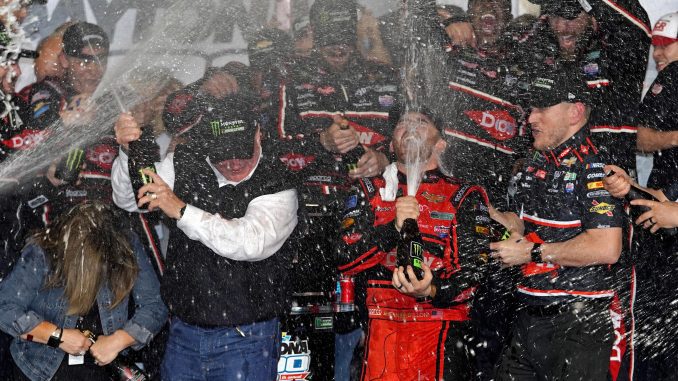
WELCOME — As a boy growing up within earshot of Charlotte Motor Speedway, Justin Alexander spent many a Sunday afternoon watching his favorite driver, Dale Earnhardt Sr., race his iconic No. 3 Chevrolet into Victory Lane.
It was an experience he got the chance to relive two weeks ago at the Daytona 500.
Alexander is now the crew chief for that No. 3 car, driven by Austin Dillon. But as he sat high above the pit box sweating out the final lap of stock car racing’s most prestigious event, he might as well have been that excited young fan watching on TV from his living room couch.
About all he could do was cheer his guy on and pray.
“It’s really up to the driver,” the 33-year-old Charlotte native said. “There’s nothing really much that I can do. I’m just kind of sitting back watching and hoping for the best outcome.”
Dillon started that last lap, a green, white, checker dash to the finish, in fourth place. He quickly moved to the front before making an aggressive pass that spun Aric Almirola into the wall and produced the outcome for which Alexander was hoping.
The victory, which came on the 20th anniversary of Earnhardt’s one and only Daytona 500 win, set off a wild celebration among the Richard Childress Racing crew and its young chief, who got his start in the business as a student at NC State.
Alexander’s first experience in racing came as a member of Wolfpack Motorsports, a team that designs and builds prototype cars for a competition against other schools.
Although he’d always loved sport, he never seriously thought about it as a career until coming to a stark realization after his graduation with a degree in mechanical engineering.
“I always loved the automotive industry, but I knew that there were only so many avenues you can go down with that as a mechanical engineer,” he said. “I didn’t really want to move to Detroit, which is where the automotive hub is for most everything. So I was like, racing would be really cool to get into. I love the sport. I enjoy it. So I thought, why not?”
His first big break came shortly after graduation when he was offered a job by Chad Knaus, the crew chief for seven-time NASCAR champion Jimmie Johnson at Hendrick Motorsports, whom he had met a few months earlier at a seminar.
Alexander quickly moved through the ranks, moving over to RCR as crew chief for one of its Xfinity Series cars before taking over the duties for Dillon’s Cup Series ride last May. It was a partnership that clicked immediately, as Dillon drove to victory in the Coca-Cola 600, his first race together with Alexander.
“Justin is a smart guy,” said team owner Richard Childress, who also happens to be Dillon’s grandfather. “He’s really on top of it. He’s detail, detail, detail, and I’ve seen that. He’s been in (the Xfinity Series) and Austin has won with him there, so I knew it would be a good deal.”
Although many NASCAR crew chiefs came up through the ranks with grease under their fingernails, Alexander is one of a growing number of college graduates moving into those jobs as technology continues to play more of a role in the sport.
“It’s kind of a trend. It’s the way the sport’s moving,” Alexander said. “You don’t have to be an engineer to be a good crew chief. There’s great crew chiefs that never went to college. Everyone has got their niches, where they have different strengths and weaknesses.”
One of Alexander’s greatest strengths, other than his technological savvy and his attention to detail, is his ability to communicate with his driver.
It’s a skill that came into play at Daytona, as he helped Dillon stick to the team’s conservative game plan and navigate his way through a series of wrecks that took out many of the race’s top contenders.
“I need someone that works with me who understands my fiery-ness, and he understands how to talk back to me,” Dillon said at a postrace celebration at RCR headquarters in Welcome last week. “When I get wired up and angry, he comes back at me in a way that doesn’t get me frustrated but challenges me.
“If I’m mad on the radio and say, ‘This car ain’t driving good,’ he’ll say, ‘Well, how do we make it better?’ He doesn’t just say, ‘Well, drive harder.’ He knows I’m driving hard, and he believes in me. He’s a very good communicator.”
As strong as his communications skills might be, Alexander still found himself at a loss for words as he watched Dillon bring the No. 3 car he’d pulled for in his youth across the finish line first at Daytona once again.
“My mind went blank for a while,” Alexander said. “I think I blacked out. It’s kind of surreal. You don’t believe it. You go nuts. You’re screaming and yelling, trying to process that you won the Daytona 500. It’s just real special.”



